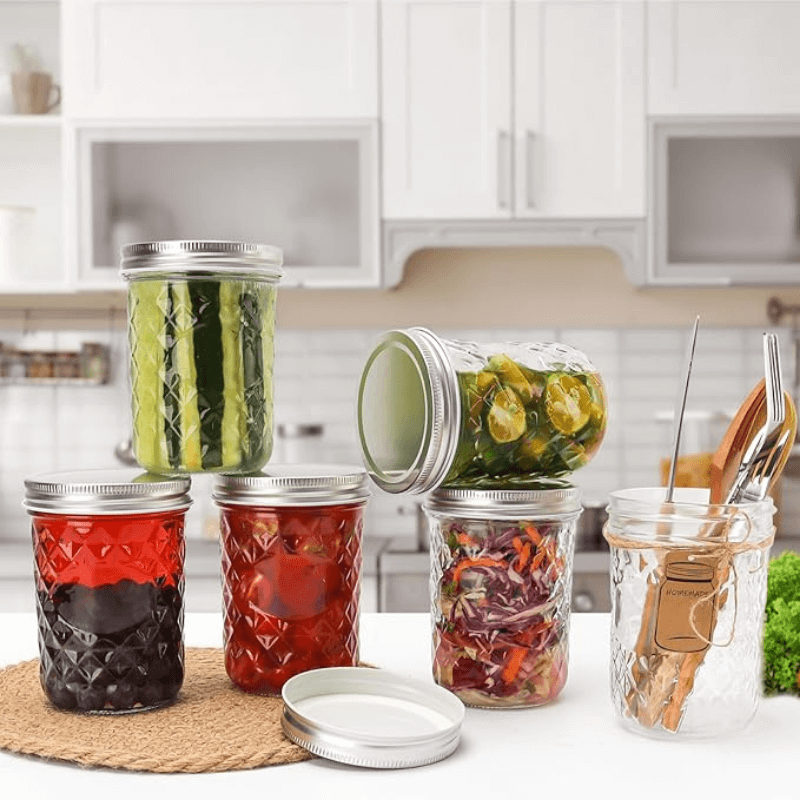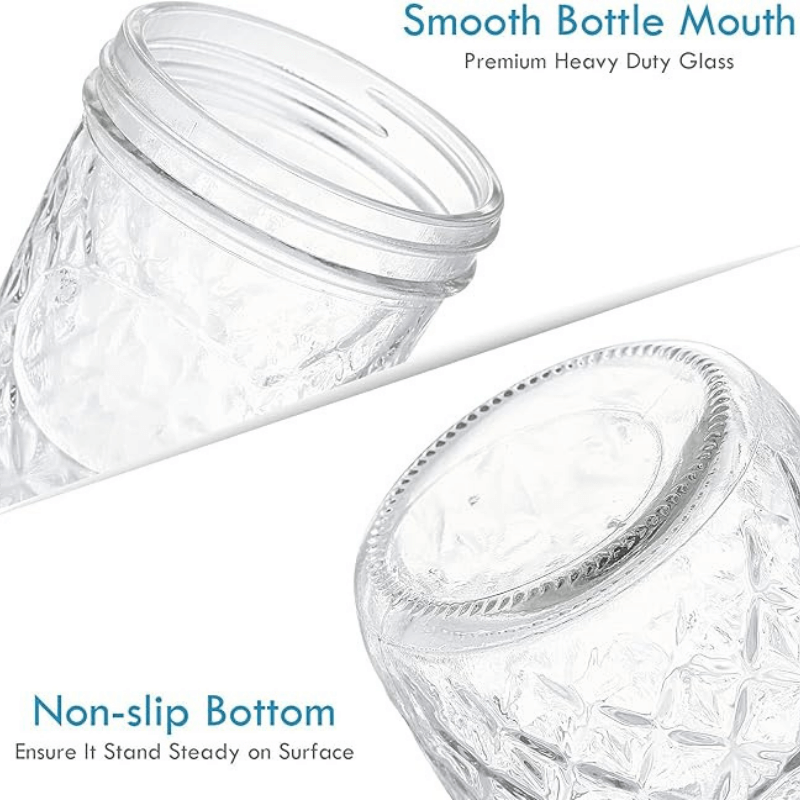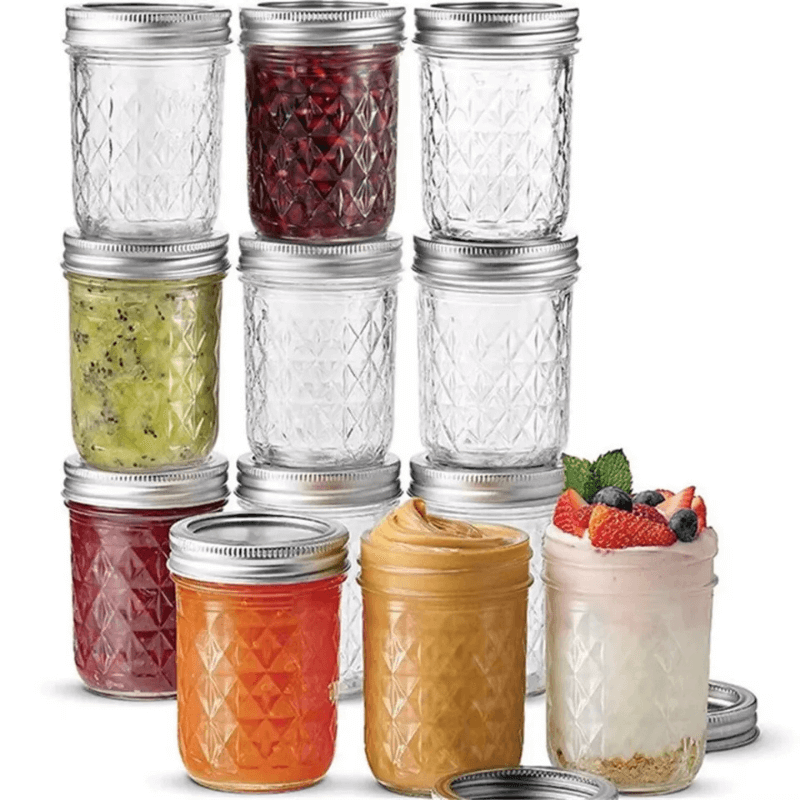


12-pack of glass mason jars with a diamond pattern features classic, durable glass containers designed with a unique textured surface. The diamond pattern adds a vintage and aesthetic touch, giving each jar a bit of elegance and character.
The jars are clear, allowing you to see the contents clearly, whether you're using them for canning, storage, or decorative purposes. Also including rewritable labels & a marker.

Durability
Glass mason jars are sturdy and long-lasting. Unlike plastic containers, they don’t degrade or warp over time and can withstand high temperatures, making them ideal for canning and preserving food.

Non-Toxic & Safe
Glass is a non-toxic material, free from chemicals like BPA (Bisphenol A) found in some plastics. This ensures that your food stays safe and free from harmful substances, even when stored for long periods.

Versatility
Glass mason jars can be used for a wide variety of purposes—storing dry goods, liquids, canned foods, homemade jams, or even as decorative items or planters. They’re also microwave and dishwasher safe, making them convenient for everyday use.

Sustainability
Glass is 100% recyclable, making mason jars an eco-friendly option for storage. By using glass jars, you reduce plastic waste, contributing to a more sustainable lifestyle.
Have questions?
Are there any specific types of foods that should not be stored in glass mason jars?
Yes, there are certain types of foods that are not ideal for storage in glass mason jars, particularly when it comes to long-term preservation. Here are some examples:
Highly Acidic Foods: Foods like tomato sauce, citrus juices, or pickled products may react with the metal lids of mason jars, especially if not sealed properly, leading to rust or a metallic taste over time. It's best to use specially designed canning lids or use a different type of container for storing high-acid foods long-term.
Carbonated Beverages: Storing carbonated drinks or anything that might ferment (like beer or kombucha) in glass mason jars can be risky. The pressure from the carbonation can cause the jar to break, especially if the jar isn’t properly vented or sealed.
Foods that Expand During Freezing: While glass mason jars can technically be used for freezing, foods that expand during freezing, like soups or stews, should be used with caution. The expansion can cause the jar to crack or break if it’s filled too full, as glass doesn’t have much flexibility.
Oily or Fatty Foods: Foods with a high oil or fat content (like certain dressings or oils) can leave residue that is harder to clean from the jars, and over time, the oils can degrade the seals. This can lead to spoilage or make the jars difficult to reuse.
Raw or Undercooked Meats: Although it's safe to store cooked meats in mason jars, raw or undercooked meats are not recommended for long-term storage in glass jars, especially without proper pressure canning, as they can carry bacteria and pathogens that need to be cooked to safe temperatures before storage.
Can glass mason jars withstand freezing temperatures without cracking?
When freezing liquids or foods that may expand (like soups, sauces, or fruits), you must leave enough headspace at the top of the jar (about 1 to 2 inches). This allows for the expansion of the contents without putting pressure on the glass.
Wide-mouth mason jars, like The Cook Nook™ Mason Jars tend to be less prone to cracking when freezing since there is less stress on the glass from the freezing contents. They also make it easier to remove the frozen food later.
What are the advantages of using glass mason jars over plastic containers for storing homemade preserves or fermented foods?
- Glass is a non-toxic, chemical-free material, unlike some plastics that can leach harmful chemicals such as BPA (Bisphenol A). This is especially important when storing food, as you want to ensure that your preserves or fermented foods are free from any potentially harmful substances.
- Glass does not absorb odors, stains, or flavors, unlike plastic containers, which can retain smells and discolor over time. This makes glass mason jars ideal for storing strong-smelling fermented foods like kimchi, sauerkraut, or pickles, without affecting the taste or smell of other foods you store in the same container later.
- Glass provides an airtight seal, especially when using canning lids, which helps prevent spoilage and oxidation. This is especially important for preserves and fermented foods, as the vacuum seal maintains the freshness and extends shelf life without compromising the quality of the food. Glass also doesn’t degrade over time like plastic, so it continues to provide a reliable barrier to air and contaminants.
What sizes of glass mason jars are most commonly used for canning and food preservation?
Wide-Mouth Jars: These are easier to fill and empty, especially when canning whole fruits and vegetables, and they are often preferred for larger-sized jars (like 16 oz or 32 oz).
Regular-Mouth Jars: These are more commonly used for jams, jellies, and smaller items, as the smaller opening is perfect for liquids or dense foods.
Choosing the Right Size: (4 oz to 16 oz) are ideal for jams, jellies, preserves, sauces, and small batches of pickles.
(32 oz to 64 oz) are better suited for bulk items like fruits, vegetables, sauces, or pickling large amounts of food.



